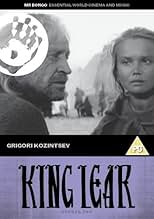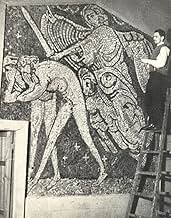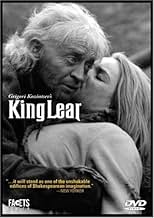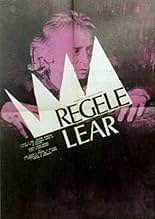IMDb RATING
8.0/10
1.8K
YOUR RATING
A Soviet adaptation of a world-famous tragedy about an aged king and how cruelly he lose his illusions.A Soviet adaptation of a world-famous tragedy about an aged king and how cruelly he lose his illusions.A Soviet adaptation of a world-famous tragedy about an aged king and how cruelly he lose his illusions.
- Awards
- 2 nominations total
Jüri Järvet
- King Lear
- (as Yuri Yarvet)
Elza Radzina
- Goneril
- (as E. Radzina)
Galina Volchek
- Regan
- (as G. Volchek)
Valentina Shendrikova
- Cordelia
- (as V. Shendrikova)
Karlis Sebris
- Gloster
- (as K. Sebris)
Leonhard Merzin
- Edgar
- (as L. Merzin)
Regimantas Adomaitis
- Edmund
- (as R. Adomaytis)
Vladimir Emelyanov
- Kent
- (as V. Yemelyanov)
Aleksandr Vokach
- Cornwall
- (as A. Vokach)
Donatas Banionis
- Albany
- (as D. Banionis)
Aleksey Petrenko
- Oswald
- (as A. Petrenko)
Juozas Budraitis
- King of France
- (as I. Budraytis)
Featured reviews
This version of King Lear is an incredible achievement due to the masterful adaptation from the Shakespeare original by one of the best Russian poets, writers, and translators of the last century, Boris Pasternak; elegant and powerful images by the cinematographer Jonas Gritsius (he also worked with Grigori Kozintsev on the earlier Shakespeare's adaptation, "Hamlet", 1964), the music of Dimity Shostakovich, and the great performances from all actors.
Estonian actor Jüri Järvet is masterful as the mad king in a performance which is reminiscent of Kinski as another brilliant madman - Aguirre. They were even the same age when they played Aguirre and Lear. The whole cast is amazing: Kozintsev chose the best actors possible for his project and everyone delivers. I'd like to mention Oleg Dal as the touching Fool; Karl Sebris as the Duke of Gloucester, whose scenes with his son Edgar after having been blinded are very moving; Regimantas Adomaitis as Edmund, a treacherous son and brother but a brilliant man; and Donatas Banionis (who played the main character in Tarkovsky's Solaris) as an intelligent and noble Albany. But like I said, everyone and everything is just perfect in this little known but IMO, the Best adaptation of the beloved and one of the most wrenching tragedies in the English and in the world literature.
Estonian actor Jüri Järvet is masterful as the mad king in a performance which is reminiscent of Kinski as another brilliant madman - Aguirre. They were even the same age when they played Aguirre and Lear. The whole cast is amazing: Kozintsev chose the best actors possible for his project and everyone delivers. I'd like to mention Oleg Dal as the touching Fool; Karl Sebris as the Duke of Gloucester, whose scenes with his son Edgar after having been blinded are very moving; Regimantas Adomaitis as Edmund, a treacherous son and brother but a brilliant man; and Donatas Banionis (who played the main character in Tarkovsky's Solaris) as an intelligent and noble Albany. But like I said, everyone and everything is just perfect in this little known but IMO, the Best adaptation of the beloved and one of the most wrenching tragedies in the English and in the world literature.
Just like in "Ran" (1985, Kurosawa) Kozintsev uses a barren landscape to illustratie the psychological wasteland of Lear. He don't need colors to do so, but the result is at least as convincing. It must be said however that Kozintsev had a "dreamteam" to his dispoasal. Which director can say that he has a Nobel prize winner (Boris Pasternak) as script writer? Also the music is taken care of by a famous classical componist (Dmitri Shostakovich). In Russian filmmaking the collaboration between directors and famous componists seems te be more common then in the West. Take for example the collaboration between Sergeij Eisenstein and Sergeij Prokofiev.
There are two ways of adapting Shakespeare, literally and transposing the story to modern times. An example of the last approach to "King Lear" is "Broken lance" (1954, Edward Dmytryk) in which the story is situated in a businessfamily. I prefer staying close to the original, and that is the approach chosen by Kozintsev.
In the English language there is a difference between a real fool (buffoon) and someone who is only acting as a fool, but in fact knows better what is going on than everybody else (jester). In "Karol Lir" the jester plays a prominent role. Keep a close look at this character while watching the film.
There are two ways of adapting Shakespeare, literally and transposing the story to modern times. An example of the last approach to "King Lear" is "Broken lance" (1954, Edward Dmytryk) in which the story is situated in a businessfamily. I prefer staying close to the original, and that is the approach chosen by Kozintsev.
In the English language there is a difference between a real fool (buffoon) and someone who is only acting as a fool, but in fact knows better what is going on than everybody else (jester). In "Karol Lir" the jester plays a prominent role. Keep a close look at this character while watching the film.
William Shakespeare's King Lear is a medieval morality play that weaves a web of complexity and intrigue based on a misjudgment of character and a struggle for succession. Containing Shakespeare's favorite themes: succession, legitimacy, and bastardy, King Lear has some of the author's most elevated poetry. It is one of Shakespeare's most difficult plays and has been filmed only a handful of times. One of the best cinematic interpretations is that of Russian directors Grigori Kozintsev and Iosif Shapiro's 1971 film, King Lear (Korol Lir), based on a translation by novelist Boris Pasternak and propelled by a dramatic score by composer Dimitri Shostakovich and memorable images by cinematographer Jonas Gritsius.
While Kozintsev does little to clarify the convoluted succession battles and internecine warfare, the overall effect is one of epic sweep and power, with the blindness of the leading protagonists being an apt metaphor in the Russian interpretation for oppressive feudal rule and its results on the downtrodden masses ("A generalized picture of a civilization heading towards doom", is how Kozintsev described his King Lear).
At a royal banquet, an aging king of ancient Britain plans to vacate his throne and divide his kingdom equally among his three daughters, Goneril, Regan, and Cordelia. Before he does this, he asks each daughter to tell him how much they love him. Both Goneril and Regan are effusive in their flattery but Cordelia is much less forthcoming, telling him that she loves him but has no words to describe her love. To that King Lear responds, "Nothing will come of nothing", and disowns Cordelia, leaving her without estate but still courted by the king of France. Sadly, Goneril and Regan both proceed to scheme against their father and each other until the wheel turns.
In a sub-plot, an elderly nobleman named Gloucester is tricked by his illegitimate son Edmund into thinking that his legitimate son Edgar is out to kill him. Fleeing the manhunt that his father has set for him, Edgar disguises himself as a crazy beggar and heads out onto the heath in a driving thunderstorm. Lear yields completely to his rage against his daughters who have turned him out and, like Edgar, rushes out into the storm. When they meet, it will be on the Dover Cliffs where each awaits their fate.
Kozintsev's Lear is filmed in black and white and set in a stark landscape of windswept moors and marshes, bare castles and wandering beggars. Kozintsev, a master Russian director and contemporary of Eisenstein, who had been making experimental films during the 1920s, assembled a cast of great actors for the project. King Lear is the thin, tall, gaunt-looking Estonian actor Yuri Yarvet who fully conveys Lear's power and his growing madness and despair. Also Leonhard Merzin and Regimantis Adomaitis as Edgar and Edmund, rival sons of the Duke of Gloucester perform admirably as does Karl Sebris as the Duke of Gloucester.
Accolades must also be given to Oleg Dal as the Fool whose only job is to amuse the King but does so by telling him the truth, using songs and riddles like Feste in Twelfth Night. In a smaller role, Valentina Shendrikova excels as Cordelia. In one of the most touching scenes, "good son" Edgar, pretending to be the madman "Tom o' Bedlam" finds his now blinded father The Duke of Gloucester wandering on a heath in pain and leads him to the Dover cliffs where he walks him to the edge and allows his father to think he is committing suicide, but saves him in a scene of the utmost tenderness. In another memorable scene, after having been banished by both Goneril and Regan, Lear wanders with the Fool and Kent, a nobleman in disguise, on the moors in a vividly-imagined driving thunderstorm until he takes shelter in a hovel, only to find the disguised Edgar.
As recounted by Kozintsev, "When Lear goes mad at the beginning of the storm scene, this is the beginning of an absolutely new relationship with nature. I try to illustrate with this landscape a country which is not bare, not cruel. I try to show Lear himself as a part of nature, in a field of flowers. His hair spreads like moss, the grey hair of nature. Once man is seen as a part of nature, the movement towards regeneration can begin. Cordelia too has her own landscapesea and a very wide landscapewith waves and seagulls. All the important characters have their own atmosphere and there are relationships not just on the level of character but between different aspects of nature." Kozintsev's King Lear has the look and feel of an epic in the tradition of Tarkovsky's Andrei Rublev, and though it has been given a Marxist slant, it is true to Shakespeare's vision. As the aging monarch confronts the wrongness of his own decision, he also realizes how little he has done to help others. "I've taken too little care of this", he laments as he confronts the suffering of his people. Faithfully accompanied by his shaven-headed Fool, Lear moves from a monarch blinded by his own arrogance in misjudging his children to a pitiful presence who finally discovers his own compassion and ultimately evokes ours.
While Kozintsev does little to clarify the convoluted succession battles and internecine warfare, the overall effect is one of epic sweep and power, with the blindness of the leading protagonists being an apt metaphor in the Russian interpretation for oppressive feudal rule and its results on the downtrodden masses ("A generalized picture of a civilization heading towards doom", is how Kozintsev described his King Lear).
At a royal banquet, an aging king of ancient Britain plans to vacate his throne and divide his kingdom equally among his three daughters, Goneril, Regan, and Cordelia. Before he does this, he asks each daughter to tell him how much they love him. Both Goneril and Regan are effusive in their flattery but Cordelia is much less forthcoming, telling him that she loves him but has no words to describe her love. To that King Lear responds, "Nothing will come of nothing", and disowns Cordelia, leaving her without estate but still courted by the king of France. Sadly, Goneril and Regan both proceed to scheme against their father and each other until the wheel turns.
In a sub-plot, an elderly nobleman named Gloucester is tricked by his illegitimate son Edmund into thinking that his legitimate son Edgar is out to kill him. Fleeing the manhunt that his father has set for him, Edgar disguises himself as a crazy beggar and heads out onto the heath in a driving thunderstorm. Lear yields completely to his rage against his daughters who have turned him out and, like Edgar, rushes out into the storm. When they meet, it will be on the Dover Cliffs where each awaits their fate.
Kozintsev's Lear is filmed in black and white and set in a stark landscape of windswept moors and marshes, bare castles and wandering beggars. Kozintsev, a master Russian director and contemporary of Eisenstein, who had been making experimental films during the 1920s, assembled a cast of great actors for the project. King Lear is the thin, tall, gaunt-looking Estonian actor Yuri Yarvet who fully conveys Lear's power and his growing madness and despair. Also Leonhard Merzin and Regimantis Adomaitis as Edgar and Edmund, rival sons of the Duke of Gloucester perform admirably as does Karl Sebris as the Duke of Gloucester.
Accolades must also be given to Oleg Dal as the Fool whose only job is to amuse the King but does so by telling him the truth, using songs and riddles like Feste in Twelfth Night. In a smaller role, Valentina Shendrikova excels as Cordelia. In one of the most touching scenes, "good son" Edgar, pretending to be the madman "Tom o' Bedlam" finds his now blinded father The Duke of Gloucester wandering on a heath in pain and leads him to the Dover cliffs where he walks him to the edge and allows his father to think he is committing suicide, but saves him in a scene of the utmost tenderness. In another memorable scene, after having been banished by both Goneril and Regan, Lear wanders with the Fool and Kent, a nobleman in disguise, on the moors in a vividly-imagined driving thunderstorm until he takes shelter in a hovel, only to find the disguised Edgar.
As recounted by Kozintsev, "When Lear goes mad at the beginning of the storm scene, this is the beginning of an absolutely new relationship with nature. I try to illustrate with this landscape a country which is not bare, not cruel. I try to show Lear himself as a part of nature, in a field of flowers. His hair spreads like moss, the grey hair of nature. Once man is seen as a part of nature, the movement towards regeneration can begin. Cordelia too has her own landscapesea and a very wide landscapewith waves and seagulls. All the important characters have their own atmosphere and there are relationships not just on the level of character but between different aspects of nature." Kozintsev's King Lear has the look and feel of an epic in the tradition of Tarkovsky's Andrei Rublev, and though it has been given a Marxist slant, it is true to Shakespeare's vision. As the aging monarch confronts the wrongness of his own decision, he also realizes how little he has done to help others. "I've taken too little care of this", he laments as he confronts the suffering of his people. Faithfully accompanied by his shaven-headed Fool, Lear moves from a monarch blinded by his own arrogance in misjudging his children to a pitiful presence who finally discovers his own compassion and ultimately evokes ours.
Black and white cinematography of Gritsius, the music of Shostakovich and the enigmatic face of Jarvet, make all other versions of King Lear smaller in stature. Lord Olivier himself acknowledged the stark brilliance of this film. Oleg Dal's fool lends a fascinating twist to the character. The "Christian Marxism" of Kozintsev can knock-out any serious student of cinema and Shakespeare.
Kozintsev is one of least sung masters of Russian cinema. His cinema is very close to that of Tarkovsky and Sergei Paradjanov. Kozintsev's Lear is not a Lear that mourns his past and his daughters--his Lear is close to the soil, the plants, and all elements of nature. That's what makes Kozintsev's Shakespearean works outstanding.
I fell in love with Kozintsev's King Lear some 30 years ago and I continue to be enraptured by the black-and-white film shot in cinemascope each time I see it. Each time you view the film, one realizes that a creative genius can embellish another masterpiece from another medium by providing food for thought---much beyond what Shakespeare offered his audiences centuries ago. Purists like Lord Laurence Olivier and Peter Brook offered cinematic versions of the play that remained true to what the Bard originally intended, only refining performances within the accepted matrices.
But Kozintsev's cinema based on the Russian translation of Nobel laureate Boris Pasternak added a "silent ghost" that was always present in Shakespeare's playnature. Mother nature is present as a visual and aural force in the two Shakespeare films of Kozintsev, more so in King Lear. Shakespeare had intended to draw parallels in nature and human beingsonly Kozintsev saw the opportunity in highlighting this. The team of Kozintsev and Pasternak took another libertythe last shot of the film includes the Fool playing his pipe, while the Bard had got rid of the Fool in Act IV of the play. Kozintsev had more than one reason for itthe Fool is akin to the chorus of Greek stage and much of Dmitri Shostakovich's haunting musical score for the film involved woodwind instruments. Further, the poor, beyond the portals of the army and the courts, occupy "screen-space" never intended in the play. Kozintsev and Pasternak remained true to the basic structure of Shakespeare only adding details that offer astounding food for thought.
I recommend this version to serious viewers. Don't miss this little known classic.
Kozintsev is one of least sung masters of Russian cinema. His cinema is very close to that of Tarkovsky and Sergei Paradjanov. Kozintsev's Lear is not a Lear that mourns his past and his daughters--his Lear is close to the soil, the plants, and all elements of nature. That's what makes Kozintsev's Shakespearean works outstanding.
I fell in love with Kozintsev's King Lear some 30 years ago and I continue to be enraptured by the black-and-white film shot in cinemascope each time I see it. Each time you view the film, one realizes that a creative genius can embellish another masterpiece from another medium by providing food for thought---much beyond what Shakespeare offered his audiences centuries ago. Purists like Lord Laurence Olivier and Peter Brook offered cinematic versions of the play that remained true to what the Bard originally intended, only refining performances within the accepted matrices.
But Kozintsev's cinema based on the Russian translation of Nobel laureate Boris Pasternak added a "silent ghost" that was always present in Shakespeare's playnature. Mother nature is present as a visual and aural force in the two Shakespeare films of Kozintsev, more so in King Lear. Shakespeare had intended to draw parallels in nature and human beingsonly Kozintsev saw the opportunity in highlighting this. The team of Kozintsev and Pasternak took another libertythe last shot of the film includes the Fool playing his pipe, while the Bard had got rid of the Fool in Act IV of the play. Kozintsev had more than one reason for itthe Fool is akin to the chorus of Greek stage and much of Dmitri Shostakovich's haunting musical score for the film involved woodwind instruments. Further, the poor, beyond the portals of the army and the courts, occupy "screen-space" never intended in the play. Kozintsev and Pasternak remained true to the basic structure of Shakespeare only adding details that offer astounding food for thought.
I recommend this version to serious viewers. Don't miss this little known classic.
My Rating : 9/10
While I am not extremely well versed in Shakespeare and much less 'King Lear' I happily appreciated this interpretation.
There is a beautiful Soviet Union quality to it, the actors appearances, the harsh weather and conditions, the wild animals and the prose of Shakespeare make it a riveting and emotionally charged oeuvre of cinema.
A fine film indeed.
While I am not extremely well versed in Shakespeare and much less 'King Lear' I happily appreciated this interpretation.
There is a beautiful Soviet Union quality to it, the actors appearances, the harsh weather and conditions, the wild animals and the prose of Shakespeare make it a riveting and emotionally charged oeuvre of cinema.
A fine film indeed.
Did you know
- TriviaGrigoriy Kozintsev made this version of the play at the same time that Peter Brook was filming Le Roi Lear (1970), and the two directors corresponded with each other throughout shooting.
- ConnectionsFeatured in King Lear (1987)
Details
- Release date
- Country of origin
- Official site
- Languages
- Also known as
- King Lear
- Filming locations
- Production company
- See more company credits at IMDbPro
- Runtime
- 2h 20m(140 min)
- Color
- Sound mix
- Aspect ratio
- 2.35 : 1
Contribute to this page
Suggest an edit or add missing content


































